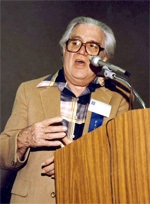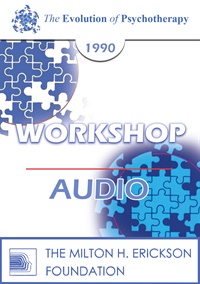EP90 Workshop 15 - The First Two Interviews in Family Therapy: Negotiating and Conducting the Blind Date - Carl Whitaker, MD
- Average Rating:
- Not yet rated
- Topic Areas:
- Workshops | Interviewing | Family Therapy | Psychotherapy | Therapist Development
- Categories:
- Evolution of Psychotherapy | Evolution of Psychotherapy 1990 | Pioneers in Couples and Family Therapy
- Faculty:
- Carl Whitaker, MD
- Duration:
- 2 hours 47 minutes
- Format:
- Audio Only
- Original Program Date:
- Dec 13, 1990
- License:
- Never Expires.
Description
Description: Dr. Whitaker reveals the power of multi-generational therapeutic engagement, demonstrating how comprehensive family involvement can uncover deep relational dynamics and facilitate profound healing.
Syllabus Description: The workshop will center on a role-played demonstration of family therapy using members of the audience. There will be an enactment of the telephone plea from the new patient to the therapist. Included will be structuring the blind date appointment between the two paranoids when the therapist is one of them. History taking and the war for the family "I" position will be demonstrated. Also discussed will be expanding the anxiety and establishing the generation gap.
Educational Objectives:
- To list ways of preventing the formation of an impasse
- To list ways to empower the family
*Sessions may be edited for content and to preserve confidentiality*
Credits
Handouts
| Timestamped Transcript (2.2 MB) | 63 Pages | Available after Purchase |
| Ericksonian Learning Snapshot (260.3 KB) | 2 Pages | Available after Purchase |
Faculty

Carl Whitaker, MD Related Seminars and Products
Carl Whitaker, MD, was an American physician and psychotherapy pioneer family therapist. Whitaker is most well-known for acknowledging the role of the entire family in the therapeutic process. He is the founder of experiential family therapy, or the symbolic-experiential approach to therapy. Rather than scapegoating one family member or even a specific family problem, experiential family therapy looks at the entire family system. Several other approaches to family therapy have drawn heavily from Whitaker's theories.


